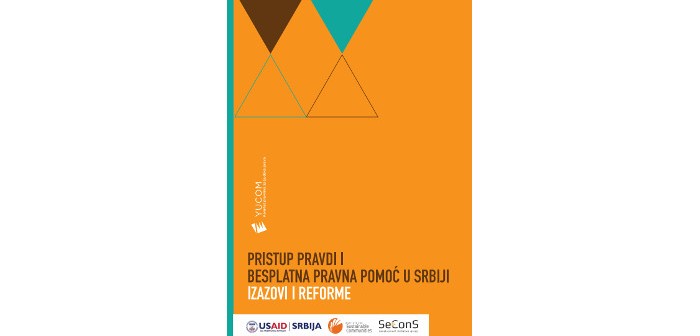Title:Access to Justice and Free Legal Aid in Serbia
Challenges and Reforms
Language: Serbian
Year: 2013
Effective legal protection is the basis of a democratic society and arises from the principle of the rule of law and the right to a fair trial, guaranteed by numerous international instruments on human rights, which Serbia has signed. Access to justice, i.e. legal protection is not possible without obtaining legal aid provided by qualified persons.
In democratic societies the right to legal aid is guaranteed to all people, however, considering that not all people are able to cover the costs, the state is obliged to provide free legal aid or legal aid with reduced costs, when reasons of equity require that. This is particularly important because the number of poor people in Serbia has been dramatically increased.
Currently, in Serbia there isn’t adequate legal framework that would regulate the system of free legal aid. The Constitution of the Republic of Serbia guarantees the right to legal aid to anyone, under conditions stipulated by law, and stipulates that legal aid is provided by the practice of law, as an self-sustaining and independent service, and services for legal aid established in the units of local government, in accordance with the law. The Constitution also stipulates that the law determines when legal aid is free. The Law on Free Legal Aid has not been adopted yet, although it has been more than six years since the Constitution has been adopted and ten years since the European Convention on Human Rights and Fundamental Freedoms has been ratified. Constitutional narrowing the circle of free legal aid is opposite to the latest comparative trends and it does not accept significant infrastructure for providing legal aid, which previously has been built by non-governmental organizations, trade unions, and increasingly the Faculty of Law in Serbia.
The publication “Access to Justice and Free Legal Aid in Serbia – Challenges and Reforms” was created within the project “Access to justice – justice for all”, which Lawyers’ Committee for Human Rights – YUCOM and Development Initiative Group – SeConS have implemented. Project is funded by USAID through the Institute for Sustainable Communities.
The research whose results have been presented in the publication has two objectives. The first objective is to detect and analyze the obstacles that citizens are facing with while they are trying to exercise their rights before the courts and state bodies. The second objective is to gain a deeper insight into experiences with free legal aid as a mechanism that is available to those citizens who, while exercising their rights, are faced with financial barriers or discrimination.
Lawyers’ Committee for Human Rights has continuously engaged in recognizing and accepting significant role that free legal aid system has for realizing human rights, social inclusion and the rule of law in Serbian society. Presented research has made a contribution to establishing an efficient, effective and sustainable legal aid system in Serbia which will be able to provide equal access to justice, the equality of citizens before the law and respect of the rule of law.
In Chapter 1 there have been presented current frameworks of free legal aid system in Serbia and critics on the draft of Law on Free Legal Aid from 2012. Chapter 2 presents a report that has been created based on the data obtained from qualitative and quantitative research conducted in the period December 2012 – February 2013 on a representative sample of citizens of Serbia and based on thirty profound, semi-structured interviews with those who provide and use free legal aid. Chapter 3 includes proposals for the reform and establishment of free legal aid system in Serbia.
We hope that the results of presented research and given proposals will contribute to further development of free legal aid system and strengthening the role of non-governmental sector in providing services in order to facilitate access to justice for the most vulnerable persons, but also to reduce poverty and social exclusion.





